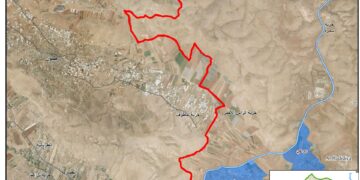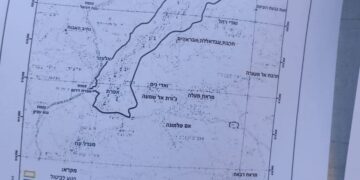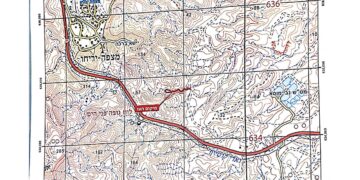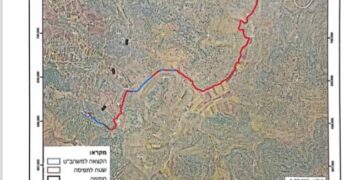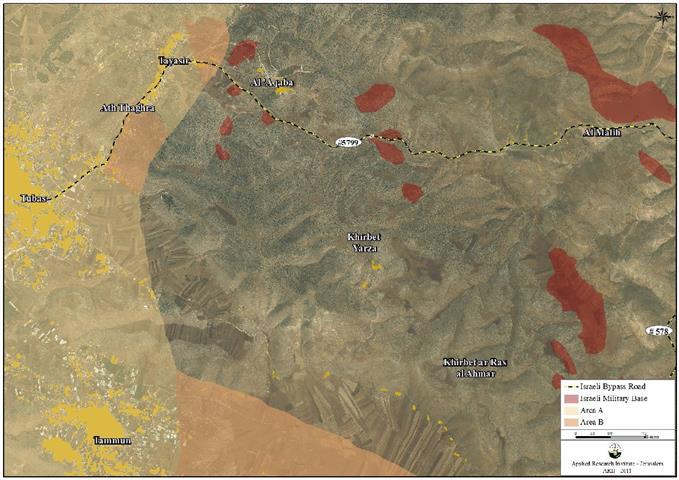On June 12, 2011, the Israeli Army Forces delivered a military demolition order to the Bruqin village council, sitting west of Salfit Governorate, in order to raze a school, a mosque under construction, and barracks. Mr. ‘Akrama Slameh, the head of Bruqin village council, indicated that the Mosque was built in the year 2009 with a total cost of more than $500,000, and is located in Area C lands where Israel has complete administrative and security control of the area according to Oslo Interim Agreement of 1995.
He also added that the mosque located in an area was proposed by the Isareli Civil Administration itself to be annexed into the village master plan; however, the plan was not formally approved by the Israeli authorities.See the pictures below:
Pictures for the Threatened Mosque
The targeted school, according to the mayor, which lies few meters away only from the village council building, was built in January 2010, with a total area of 1478 m2 and was opened this year; there were 230 students in the school for the 2010/2011 academic year.
The mayor added that the school was built on a piece of land rented from the Palestinian Ministry of Islamic Waqf, while funded by the United States Agency for International Development (USAID) and CHF with a total cost of $400,000. See the pictures and the map below:
Pictures for the Threatened School
Photocopies of the Military Demolition Orders
Map for the Targeted School & Mosque in Bruqin-Salfit
On the other hand, a 60m2 barracks used as a sheep barn, owned by the local resident Mo’ayyad Mohammad Hamdan Baker, also received a demolition order under the pretext of lacking a building permit.
Bruqin is a small Palestinian village located about 13 kilometers west of the city of Salfit. It is bordered by the Israeli Segregation Wall as well as Barqan Israeli Industrial zone to the north and Bruchin settlement to the northwest, Bani Zaid Palestinian community from the south, Farkha Village from the east, along with the Illegal Israeli settlements of Eli Zahav and Harli Zahav to the west.
The village occupies a total area of 12,656 dunums, out of which, 678 dunums (5.3% only from the total village area) constitute the village built-up area. The village is a home to 4611 inhabitants (PCBS 2010), most of which work in the agriculture sector.
The Israeli Colonial Activities in Bruqin Village
The Israeli Settlements
The suffering of Bruqin residents started in the year 1981 when Israel established Ariel West Park Industrial Zone on the village lands; furthermore, in the year 1999, Bruchin settlement was built on Bruqin village lands, where the two settlements occupies an area or 2057 dunums (20% from the total village area). See the table below:
|
Illegal Israeli Settlements Inside Bruqin Village Boundary
|
|
Settlement Name
|
Location
|
Date of Est.
|
Population
|
Area-Dunums
|
|
Ariel West Park Industrial Zone
|
Salfit
|
1981
|
Industrial Zone
|
1729
|
|
Bruchin
|
Salfit
|
1999
|
470
|
328
|
|
Total
|
*****
|
*****
|
470
|
2057
|
|
Source: ARIJ Database 2011
|
Ariel West Park Israeli Industrial Zone
The Israeli Ariel Wes Park Industrial Zone was established in the year 1981 on 1729 dunums of lands from Bruqin village. It contains many chemical, plastic, Aluminum and oil factories which disposes of its waste by opening the sewage pipes toward Bruqin village lands where we can see the liquid waste about 8-10 meters only away from the houses of the residents, which caused many health problems to the local residents in addition to its catastrophic consequences over the environment and the soil in the area.
Moreover, the sewage water of the Industrial zone causes the pollution of 3 main water springs in the village, where these springs provides the village of Bruqin with 70% of the necessary water supply needed for drinking and watering the plants and crops. The springs are Al- Matwi, Al- Barkoni and Ein Al- Baten are all located in the eastern side of the village.
The Israeli Segregation Wall
The village of Bruqin, as well as the rest of the Palestinian communities had been severely affected by building the Israeli Segregation Wall. The wall stretches 8 km inside the village lands, isolating 3902 dunums (30.8% from the total village area) behind its path, annexing the Illegal Israeli settlement of Ariel [1] into an Israeli enclave along with the settlements of Kiryat Netafim, Revava, Barqan and Ariel West Park Industrial zone.
Legal & International Status
The Israeli government is moving forward with its colonial, non-humanitarian approach against the residents of the oPt, where all of the Palestinian lands, properties, schools, and houses of worship are legitimate targets.
The confiscation and destruction of Palestinian land is clear violation of the Fourth Geneva Convention, Article 147 which clearly prohibits extensive destruction and appropriation of property, not justified by military necessity and carried out unlawfully and wantonly; and Article 49 of the Fourth Geneva Convention also states that: ‘ Individual or mass forcible transfers, as well as deportations of protected persons from occupied territory to the territory of the Occupying Power or to that of any other country, occupied or not, are prohibited, regardless of their motive.‘ Violations of Articles of the Fourth Geneva Convention constitute breaches of the Convention and should be prosecuted as War Crimes.
Israel continues to violate its obligations as an occupying power under international law rules. The Israeli practices in the Palestinian territory clearly contradict with the following:
-
The International Covenant on Economic, Social and Cultural Rights (ICESCR) – Food (ICESCR, art. 11): The States Parties to the present Covenant recognize the right of everyone to an adequate standard of living for himself and his family, including adequate food, clothing and housing, and to the continuous improvement of living conditions. The States Parties will take appropriate steps to ensure the realization of this right, recognizing to this effect the essential importance of international co-operation based on free consent.
-
The International Covenant on Civil and Political Rights (ICCPR) – Property (ICCPR, article 1) provides that: All peoples have the right of self-determination. By virtue of that right they freely determine their political status and freely pursue their economic, social and cultural development.
-
Universal Declaration of Human Rights, the 10th of December 1948, General Assembly Resolution 217/A/III, Article 17 stated: ‘No one shall be arbitrarily deprived of his property.’ Which means it bans Israel from destroying or confiscating the property of the Palestinians at any case’.
1] Ariel: Illegal Israeli settlement established in the year 1978 on 5185 dunums of Salfit lands. The settlement populated by 16,800 Israeli settlers.


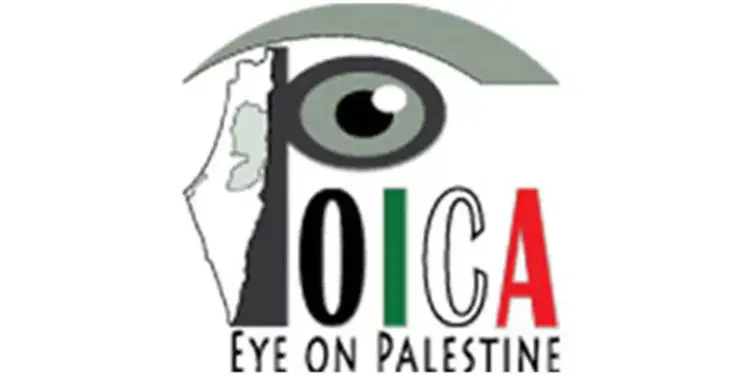
.jpg)
.jpg)

.jpg)
.jpg)
.jpg)
.jpg)
.jpg)
.jpg)
.jpg)
